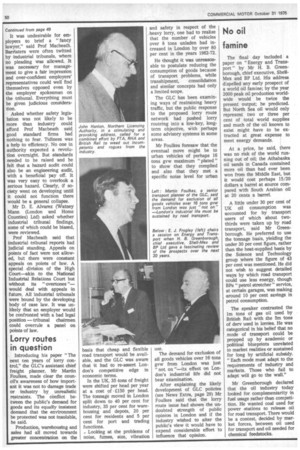No oil famine
Page 52

If you've noticed an error in this article please click here to report it so we can fix it.
The final day included a paper on "Energy and Transport" by Mr H. B. Greenborough, chief executive, ShellMex and BP Ltd. His address dispelled any early prospect of a world oil famine; by the year 2000 peak oil production worldwide would be twice the present output; he predicted. But North Sea oil would only represent two or three per cent of total world supplies and much of the oil known to exist might have to be extracted at great expense to meet energy demands.
At a price, he said, there was no risk of the world running out of oil; the Athabaska oil sands in Canada contained more oil than had ever been won from the Middle East, but it would -cost perhaps 15/20 dollars a barrel at source compared with South Arabian Oil at 20 cents a barrel.
A little under 30 per cent of UK oil consumption was 'accounted for by transport users of Which about twothirds were taken up by road transport, said Mr Greenborough. He preferred to use the tonnage basis, yielding the under 30 per cent figure, rather than the heat-supplied basis by the Science and Technology group where the figure of 43 per cent was mentioned. He did not wish to suggest detailed ways by which road transport could use less energy, though BPs "petrol stretcher" service, at certain garages, was making around 10 per cent savings in petrol consumption.
The speaker ,contrasted the lm tons of gas oil used by British Rail with the 5m tons of dery used in lorries. He was categorical in his belief that no .mode •of transport could be propped up by academic or political blueprints unrelated to market realities or sustained for long by artificial subsidy. "Each mode must adapt to the requirements of industry and markets. Those who fail to adapt will go to the wall."
Mr Greenborough declared that the oil industry today looked for complementarity in fuel usage rather than competition. He wanted coal used for power stations to release oil for road transport. There would be a contest, decided by Market forces, between oil used for transport and oil needed for chemical feedstocks.
































































































